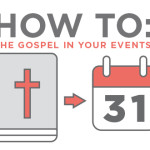Following up with students after an event is a vital part of ministry and discipleship. In Part Two of this three-part series, I’ve asked Michael Kell, Student Ministry Pastor at Liberty Church in Moreno Valley, Ca., about this important topic.
— Ben Trueblood
Ben: What advice would you give to student pastors about constructing their own follow-up process?
Michael: First, you have to view it as a stewardship issue between you and God. This perspective will hopefully provide the accountability and the motivation to do the little things behind the scenes that most will never see.
Second, write it out and let someone look at it to see what you are missing. We are all good at something so find an adult who can help make sure you aren’t missing something. Put it on the calendar.
Third, work the plan. The event doesn’t end just because you turned in the van keys. The fun and games are probably over, now we echo Paul and plead with the students to walk with Christ. So, don’t be lazy. Go home, get some sleep but get up and get back to work quickly. Make the calls and get in the living rooms of the families so that the work you did to pull off the event is not in vain. This may be a step where you need to bring in additional adults to help. If you just had a volunteer use their vacation to go on a mission trip, they may not have the time to make visits. Can you give a $5 Starbucks to a new adult to meet up with that volunteer, get some follow-up direction and then take the baton? Don’t burn out your leaders, but let them share then load.
Ben: What kinds of things do you follow up on with students and families after an event?
Michael: The last thing I want is one-hit wonder events. So we try to connect them all together and that includes connecting the event/service to the parents. The Bible teaches that the lead on spiritual development occurs in the home. So, with that in mind, we try to let parents know the spiritual details of the event. We try to do this for everything. We let them know the spiritual direction of the event, including topics, Scripture, etc. We also try to resource them with discussion starters and follow-up questions that they can ask their child to foster discussion. We also to try to connect parents during the event if possible.
I think the most important thing is to connect parents by letting them know if the students made any decisions. I generally do this by pulling a parent aside with the student. I then celebrate and encourage the student to share with their parent what God did in their lives. It’s also important to communicate or debrief with any leaders who went to share what they saw or heard. Often, that paints the bigger picture.
I’m also try to make sure we communicate a “win” to every parent. Sometimes, that’s a spiritual decision, good behavior or even just a middle-school boy deciding to shower without having to be told to. But, I want every parent to have a win. So, I’ve followed up with a decision to surrender to Christ as well as a student’s decision to serve everyone breakfast. Parents worry about their child spiritually and even socially. So, we want to communicate wins and direction for every child. It’s not always just the decision to be a missionary to Iraq that needs to be followed up on. We need to follow-up with every kid and see how this event moved them forward in some capacity.
Ben: What are you trying to accomplish with a post-event follow-up process?
Michael: With post-event follow up, I’m still trying to accomplish the goals of the event, as well as build forward. Many times, God is still working on students after the trip. When they get home and have time to think or process, I’ve seen students then make decisions. I’ve also seen students forget everything they decided at the event. So follow-up is about keeping the door open as well as helping make the event stick. Not to sound redundant but I am also trying to teach parents how to disciple their child with the follow-up process.
Ben: What has worked really well?
Michael: I try and delegate to volunteer’s strengths. Some of my leaders are great at being in the moment and could sit and chat for hours while others are better at big pictures and driving tasks.
The first type I want to free up to take advantage of those closing moments when we have both parents (there for pick-up) and students in the same place. This is our first chance to communicate and follow-up.
Second, I try to avoid only talking about the non-spiritual details of the event leading up to it. Yes, they need the departure times and packing list, but they need to see how this Sunday School lesson sets them up for camp. Conversely, afterwards we try and keep talking about how the event set you up for this particular Sunday School.
Third, we try to keep parents a part of the event as much as possible. We send out text message updates before service times at over night events. It lets parents know how to pray. Also, on longer events, we bring letters from home. This is my absolute favorite thing we ever done. We have parents write a letter per student for every day of the event. We then deliver mail every morning. I also get as many adults as I can to also write a letter to a student, all students, or even the group. I encourage parents to at minimum let the student know they are praying for them and share an encouraging verse. Side note, don’t forget to get letters for your leaders, too. A note from their kids can go a long way to prolonging a volunteer’s sanity! I believe that this is critical because if the parents or church is connected to the student during the event it will be easier to keep them connected after the event.
Ben: How has your own event follow-up process helped you in your student ministry?
Michael: A good follow-up process will help create momentum for events. It has also helped us assimilate whole families into our church. For example, a student visited an event with a friend. We followed up on the friend and met the family. We were able to lead the parents to Christ and add the family into our ministry.
It’s also helped us grow. We were a church plant so as we followed up with our students we thought about how can this lead to more students. We try and do follow-up in public places when appropriate. Could you have a conversation about what a student learned at camp at their lunch room table in front of their friends? Can you let a student know that you want to meet them for ice cream to talk about what they learned at camp and have them invite some friends to hear their story? Opportunities like that can set the stage for easy invitations for prospects.
Finally, a good follow-up process will keep you in the ministry long term. Nothing is more frustrating then working hard to raise funds, dragging kids around the world then coming home to see kids returning to their old ways. Do that enough and I’ve seen guys get burned out or run to a new ministry where they can stir up excitement again. A good follow-up process will help you see fruit and know that ministry is happening. It will also help you see the difference that you are making in students’ lives. When we know God is at work and changing the lives of students, we’ll stand in front of any firing squad or endure any trial because it all becomes worth it. So, follow-up will save your sanity and prolong your ministry.
Read: Part 1 of Making Your Events Matter by Derik Idol
Michael Kell is the Student Ministry Pastor at Liberty Church in Moreno Valley, Ca. Michael has been there since the church was started in 2003. Michael is a husband, dad, coffee drinker and avid soccer fan. If you have felt that frustration from one-hit wonder events and need encouragement, you can find Michael at @mikekell or facebook.com/mkell.



